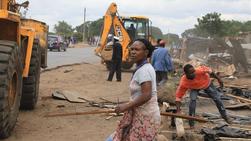 People collect timber after an unlawful market was dismantled in Harare, Zimbabwe, April 19, 2020. (PHOTO BY WANDA / XINHUA)
People collect timber after an unlawful market was dismantled in Harare, Zimbabwe, April 19, 2020. (PHOTO BY WANDA / XINHUA)
The health ministry in Mali recently corrected a media report that claimed the country only had one ventilator; a type of machine that has become essential to health care systems during the COVID-19 crisis.
The updated figure, however, did little to soothe concerns. Mali officials said there are 41 ventilators in public hospitals, and 15 of the devices in private hospitals, across the nation of 19 million people.
COVID-19 has yet to truly take hold in Mali and much of sub-Saharan Africa, a region that accounts for less than 0.5 percent of total cases. So far, around two thirds of all confirmed cases have occurred across the two largest economies in the world - the United States and China - and the five largest economies in Europe, namely Germany, the United Kingdom, France, Italy, and Spain.
ALSO READ: Regional cooperation vital for virus response
The World Health Organization warned that Africa could soon become the new epicenter for the pandemic, and a severe lack of ventilators is just one of the concerns many countries on the continent must contend with
Having seen what a strain the virus has placed on these wealthy nations, it is sobering to consider what will occur if the disease takes a similar grip on the world's poorest regions.
The World Health Organization warned that Africa could soon become the new epicenter for the pandemic, and a severe lack of ventilators is just one of the concerns many countries on the continent must contend with.
Existing national debt among some of Africa's poorest countries is being compounded by a dip in exports of commodities and raw materials, as major trading partners contend with the COVID-19 pandemic. African tourism, which accounts for 8.5 percent of the continent's GDP, has ground to a halt.
Emergency funding
Ethiopia's Prime Minister Abiy Ahmed has asked leaders from the G20 group of major economies for US$150 billion in emergency funding to address this "existential threat to the economies of African countries".
Last week, finance ministers from the G20 announced plans to freeze an estimated US$12 billion in debt obligations for 76 of the world's poorest nations, with 40 sub-Saharan countries qualifying.
In addition, the International Monetary Fund has announced it will cancel US$215 million of debt payments for 25 countries during the next six months, due to the pandemic.
The aid and development charity Oxfam said the move by the G20 was an important first step, and called on private creditors and multilateral lenders to follow suit.
Poor countries owe huge sums to private banks and investors in New York and London, which should be pushed to cancel debts by enforcement and not left to voluntary action, Oxfam said.
It also called for the cancelations of all debts due this year to international financial bodies, including the IMF and the World Bank.
"Far more needs to be done to rise to this moment of unprecedented need and save millions of lives," said Nadia Daar, head of Oxfam International.
"The G20 must not allow the suspended debt payments to accrue into the future. They must cancel all the 2020 debts of all the countries that are being hit by this economic tsunami, and all creditors must follow suit urgently."
READ MORE: Xi: China, Zimbabwe to step up pandemic fight
The Jubilee Debt Coalition in UK said last week's announcements by the G20 and the IMF amount to a "drop in the ocean" compared with the amount of debt cancellation that will be needed this year and next among low-and middle-income countries. The organization estimates that these countries will require debt moratoriums valued at a combined US$300 billion in order to fight the virus.
"The scale of the economic crisis faced by developing countries requires the IMF to go much further," said Sarah-Jayne Clifton, director of the Jubilee Debt Campaign."We need the cancellation of payments to be extended to a much bigger group of developing countries and to be for the next full year."


